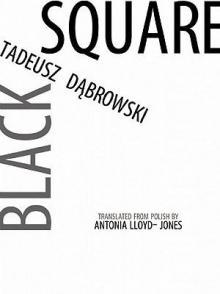Black Square
by Tadeusz Dąbrowski, translated by Antonia Lloyd-Jones
reviewed by Ben Purkert
Tadeusz Dąbrowski’s Black Square presents an entrancing geometry of contrasts. Opposites are routinely set against one another in these poems, yielding a landscape of “churches / next to brothels, graveyards next to solaria,” along with many other unexpected pairings. Rarely, however, do the boundary lines hold; Dąbrowski delights in spilling each form into its antithesis, dissolving any delineation. As his poem “light” explains, “Think of bars that cease to exist / the closer you get to them.”
This latest collection from the thirty-four-year-old Dąbrowski takes inspiration from the work of Tadeusz Różewicz, a fellow Polish poet and, alongside Miłosz and Szymborska, one of the nation’s postwar masters. Różewicz’s “Gray Area,” translated here by Joanna Trzeciak, lays important groundwork in this matter of boundaries:
here white is not absolute white
black is not absolute black
the edges of these noncolors
touch
[ . . . ]
the world we live in
is a variegated vertigo
but I don’t live in that world
Różewicz treats the poetic line as a kind of “gray area” in which to challenge society’s convictions (the “absolutes”) through critical juxtaposition. But the life of the poet comes with sacrifice. Bound to the monochromatic field of his work, Różewicz’s speaker does not reside in the same colorful realm that “we” exist in.
Dąbrowski’s speaker, on the other hand, embraces all the pleasures modern life affords: Tarantino, internet porn, numerous late-night escapades. As one poem boasts, “we’ll mix beer and wine / with vodka.” But Dąbrowski’s concoction is far from godless: at nearly every turn these poems invoke the presence of some higher authority, though not necessarily paying tribute to God.
“The Meadow” includes one such tryst and consequent soul-searching:
I carried you unintentionally in my arms from a go-
go club straight into my bed and thoroughly
rubbed you into the bedclothes so now hardly do I awake
fall asleep or dream than without failbefore my eyes stands a pastel image of quivering
breasts and every single time I feel a delicious
pain as if I don’t give a sniff about conscience.
The continual strain for moral clarity powers Dąbrowski’s work. A reader is left to wonder: has the poem’s addressee been “carried . . . unintentionally” as a gesture of brutish seduction or salvation? And is the speaker literally bearing the addressee herself or simply some memory of her: “a pastel image of quivering / breasts”? The poem resigns itself to ambiguity in the bare syntax of its final lines: “when lying in bed / I feel at the same time both good and bad.”
This fixation with doubleness—good and bad, black and white—emerges both thematically in these poems and also on the level of word choice. As the book’s translator, Antonia Lloyd-Jones, notes in her afterword, Dąbrowski packs his verses with a multiplicity of meaning which is often difficult to replicate in English. She directs our attention to the title “The Meadow”; in Polish, the word łąka may suggest łączyć or “coupling,” but this association is lost on the anglophone ear. Proving even thornier are moments of more lurid sexual innuendo. For instance, the poem’s phrase staje mi or literally “it stands” is common Polish slang for an erection; in the English version, this wordplay falls out, though the line “rubbed you into the bedclothes” may provide some hints.
Lloyd-Jones does fine work to convey Dąbrowski’s plainspoken lines in their starkness, particularly where the poet graphs his anxieties around mortality. Here we find the book’s titular metaphor, and one exquisitely rendered: “Someone who promptly appears and disappears / like a black square on a black background.” Life, Dąbrowski suggests, flickers out with the inevitable loss of its edges.
Language similarly functions as a sort of edge, though it too cannot reliably contain the rich dimensionality of human experience, for “the space between the word death / and the truth of death is the greatest. Within it / life happens.” The formal elements that give shape to Dąbrowski’s work—long, loosely punctuated lines culminating in sudden enjambment—only sharpen these many points of revelation.
For all its gallivanting, Black Square contains no shortage of genuine sentiment. Rather, these poems rail against the barriers that segment our existence. Admitting the limitations of reason, Dąbrowski champions instead the enlivening possibilities of intuition along with his own unique brand of faith, declaring, “poetry is when / you feel.” Advocating for the visceral, Black Square succeeds in re-sketching the old dichotomies surrounding right and wrong. “Drawn with the hardest pencil,” the ethical conclusions of these poems remain open to re-examination and revision.
NOTE: With thanks to Piotr Holysz.
Published on November 19, 2013

